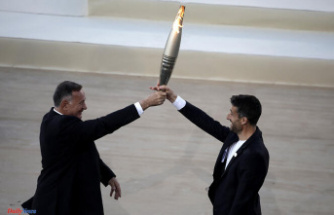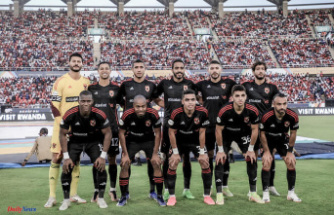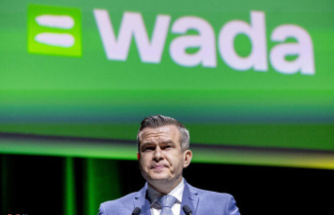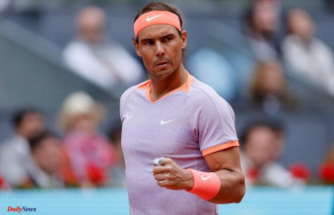European champion over 400 meters without hurdles, European champion over 400 meters with hurdles: Femke Bol dominates the stadium round at the European Athletics Championships in Munich. The Dutchwoman trains differently than it is practiced in the German long sprint. Your trainer sees several advantages in this.
Femke Bol floated so lightly to the finish that it didn't look like she had just completed 52.67 seconds of maximum effort. In her fourth race at these European Championships, the 22-year-old was the winner for the fourth time. The Dutchwoman is the outstanding athlete of these title fights. She had already clearly won the 400 meters on Wednesday evening with a lead of exactly 0.5 seconds, over the stadium lap with hurdles she even outclassed the European competition by 1.63 seconds.
On the flat track she improved her own Dutch record in 49.44 seconds and the European annual best, over 400 meters hurdles even the abbreviation "CR" lit up on the scoreboards: championships record, championship record. And as if that hadn't happened, Bol then went on the lap of honor with his step still loose and springy. "I'm super happy," she said in an interview in the stadium and then kissed the hands of the spectators a few times, who rightly acknowledged their achievements with loud, sustained applause.
"It's going to be a tough summer," said the long sprinter, who was born in Amersfoort on February 23, 2000, in June, "but I'm ready for the challenge." After that, she gave a clear goal that she wanted to "keep running fast and win a few medals." Since then, Bol has won two World Championship silver medals in the 400m hurdles and in the mixed relay in the 4x400m and has now been crowned two-time European Champion in Munich. A third medal, maybe even a third gold, is quite realistic on Saturday evening if she moves over 4x400 meters to the Dutch team, which had also won the heat without her.
In the relay final, Bol will also run against a German selection, the quartet of the German Athletics Association benefited from the disqualification of the Czechs. In view of these circumstances, it is unlikely that the Dutchwoman, who is usually used as the final runner, will get into a neighborhood duel with the hosts in the last round. While Oranje has experienced a remarkable upswing on the stadium circuit in recent years, the 400 meters in the DLV are more of a problem child.
This was also evident at the European Championships in Munich, with five individual starts no one made it in the final, Corinna Schwab probably had the most bitter experience. After the semifinals, she felt "as if someone had pulled the plug on me," adding: "I have no explanation for that." Already after 250 meters they seemed to lose their strength, in 52.70 seconds they stayed 1.8 seconds above their best time and presented themselves the next day in the 200-meter semifinals as a supposed medal candidate so far away from the top form that they not even lined up in the 4x400m relay.
At this point, however, it should not be about individual achievements, and certainly not about attacking Corinna Schwab. Her statement that she felt as if someone had pulled the plug is much more exemplary of the weaknesses in the German long sprint. At least that's how the findings of Laurent Meuwly, the coach behind the Dutch successes on the stadium round, the home coach of Femke Bol, should be understood. In the "Süddeutsche Zeitung" Meuwly said recently that he was not convinced of the German way of fast 400-meter times. "From short to long" is the mantra there, i.e. the approach to training sprint endurance with a large number of short, hard runs.
Luna Thiel recently explained what this mantra looks like in practice in the track and field podcast "Mainathlete". Your home coach is Edgar Eisenkolb, currently national coach 400 meters for men, previously he was responsible for women. "We [...] do more about the short sprint speed with few breaks" and "not so much this scope with 500, 600 [meter runs] and the shorter runs for it very intensively," says Thiel there, the in Munich belongs to the German squadron.
A "very typical tempo run unit from us" consists of six maximum 60-meter sprints with just a 30-second break, "then a long run, then we do this short series with the very short breaks again." In competition, this approach often manifests itself in race designs that expert observers summarize as "300 meters plus X". Start running at maximum speed in the hope that your legs will still work on the home stretch. The Germans are often competitive up to the 300 meter mark. Again and again, the division of the race leads to scenarios like that of Schwab, who almost gave the impression of stopping for the last few meters.
Meuwly considers this approach to be far too one-sided, comparing it in an interview with the "Süddeutsche" with a house in which not four walls are erected, but only two. His plans also include larger volumes, longer runs, at a slower pace, but by no means always at maximum speed. According to Meuwly, the borrowings from the middle-distance training help to complete several rounds - preliminary heats, semi-finals, finals - at a high level in major championships. In Germany, on the other hand, the Swiss continues, the assumption is still widespread "that endurance makes you slow in the sprint". This obviously does not apply to Femke Bol.












